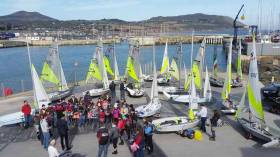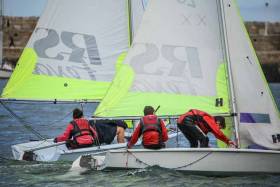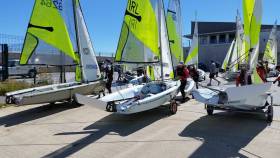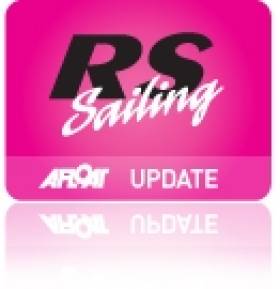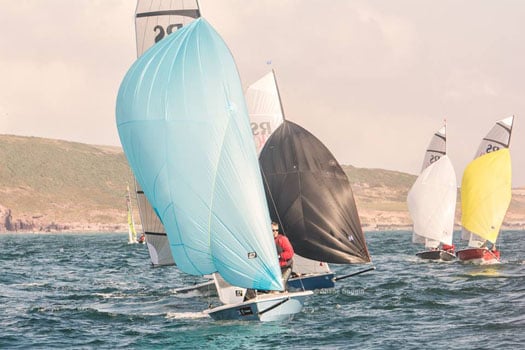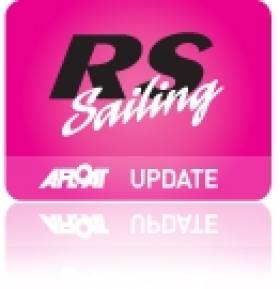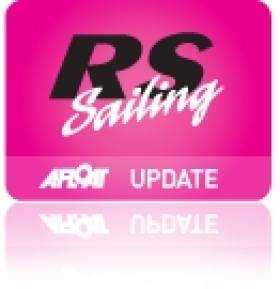Displaying items by tag: Feva
Happy New Year as RS Sailing Reflects on a Record Breaking 2023
Brilliant events, informative shows and some new records broken by RS Sailing and RS sailors.
It was a brilliant summer of events for RS Sailing. Highlights include the RS Feva World Championships which saw 422 sailors coming with their families to enjoy an amazing week at LNI Follonica in Italy. This was the biggest RS Feva event to date and was the best-attended World Sailing Youth Class World Championships in 2023. “It’s amazing to see that the RS Feva is the fastest growing two-person youth class internationally when you look at World Sailing’s figures.”
 There was a thrilling finale at the RS Feva World Championships 2023
There was a thrilling finale at the RS Feva World Championships 2023
Back home in Ireland, Kenny Rumball, RS Dealer, is equally thrilled with the RS Feva class, “ For the first year in quite a while, we have seen a growth in the RS Fevas! The first event of the year in the Royal Irish Yacht Club saw over 30 boats back competing and we were more than delighted to sponsor the event!”
RS Sailing also supported World Sailing at the Para Sailing World Championships 2023 at WV Braassemermeer, Netherlands. The RS Venture Connect was one of the three boats selected again by Para World Sailing to be part of the World Sailing World Championships together with the Olympic Classes.
The RS21 World Championship 2023 also broke records this year; 55 boats from 11 countries competed in Porto Rotondo in Sardinia, Italy. “This is such a big achievement for a relatively new class. It’s also a class that is really putting a good stamp on the sustainability side.” The RS21 Italian Class is the first sailing class in the world to achieve ISO20121 certification. Created by the International Organization for Standardization, this certification is only awarded when an event organiser adheres to a detailed set of requirements that meet the international standard for sustainable event management. Not only was this a big success at the World Championships, but the class was also invited to present a ‘Sustainability Masterclass’ as part of the World Sailing Sustainability Sessions.
 Record-breaking attendance at the RS21 World Championship 2023 in Sardinia
Record-breaking attendance at the RS21 World Championship 2023 in Sardinia
The RS21s also saw great success in Ireland with the class choosing Dun Laoghaire Regatta to showcase themselves as the future of sportsboat sailing. Teams from all over Europe came to compete in Ireland in the thrilling one-design keelboat showcasing their speed and futuristic design.
The RS21s will be at Cork Week 2024 with charter boats now available for charter! Don’t hesitate to contact Kenny [email protected] for more info.!
“We’ve also been honoured to work with some great partners this year.” In October, RS Venture Connects were raced in SailGP’s We Foundation One Sport Race and we confirmed our preferred vendor partner agreement with Crystal Lagoons. In September, we announced our partnership with Jeddah Yacht Club & Marina; providing an extensive range of boats to their state-of-the-art JYC Academy which has already seen 1000+ children benefit from the programmes this year.
It’s been a particular good year for RS Sailing on the international stage. “Globally, we’re expanding further and wider in all corners of the world. 2023 has seen growth in many classes; from RS21 fleet building in Canada to Japan’s first-ever RS Aero National Championship in the All Japan RS Open 2023 event.”
 A busy scene at Blessington Sailing Club as the inaugural RS Fest incorporating RS200 and RS400 dinghies championships gets underway in June 2023
A busy scene at Blessington Sailing Club as the inaugural RS Fest incorporating RS200 and RS400 dinghies championships gets underway in June 2023
In Ireland, we celebrated the inaugural RS Fest in Blessington Sailing Club. For the first time ever all the RS classes in the country came together for a weekend of thrilling racing combining the RS Feva, RS Aero, RS 200 and RS 400 classes.
Kenny Rumball commented, “We want all sailors of the RS classes to really feel part of the family. It was fantastic to work with Canice Keane and his team from Blessington Sailing Club for the inaugural RS Fest this year! We already have plans well established for similar in 2024. Stay tuned for a press release on this in the coming month!”
Finally, we rounded off the year with the RS Toura winning ‘Best Dinghy’ in Sailing World’s Boat of the Year Awards. “This prestigious title means a great deal to us – especially all of those behind-the-scenes in production and development. Recognition like this serves to affirm our position as the world’s leading small boat manufacturer.”
2023 was special in Ireland as the class associations website got a revamp to make it easier for sailors, and prospective members of the RS family to find out all the information on RS classes in Ireland. If you haven’t visited it yet, head on over to RSIreland.com where you can find all the information on the RS classes in Ireland.
2024 marks RS Sailing’s 30th birthday and we are celebrating it in the best way that we know how; a huge party and weekend regatta commemorating the sport that we love. We hope to see you all there at the 30th Anniversary at Hayling Island Sailing Club, 17th-19th May. In the meantime, check-out RS Sailing Club for all the events near you and internationally.
“Thanks again for being part of the RS Sailing family in 2023. I’m really looking forward to a good 2024. Our amazing team will – for another year – work hard to gain more participation in our sport, set high standards at events and build boats that are there to last.”
Feva 'Final Fling' Held at the Royal North of Ireland Yacht Club
The enticingly named RS Feva Final Fling and Social on Saturday afternoon (7th) is being held at the Royal North of Ireland Yacht Club on the south shore of Belfast Lough.
Four of the nine boats entered were from Ballyholme Yacht Club, six miles to the east.
Of these, Emily and Annabel Ridout won the Youth section of the Northerns held at East Down YC on Strangford Lough, and Matthew and Peter Ridout were first in the Family division with Aileen and Louis Smith runner-up. Topping the Juniors in the same event were Sally Nixon and Jessica Dadley-Young.
 Emily and Annabel Ridout racing at the RS Feva Northerns
Emily and Annabel Ridout racing at the RS Feva Northerns
Racing for the host club are Niamh Coman and Ellie Nolan, who were runners-up in the Juniors at the Northerns, and they will be joined by Sophie Murray and Lucy Anderson, Martha Nolan and Cara Coman.
RNIYC also has two club boats, which will be sailed in the event to encourage growth in the Feva fleet.
The action begins with a briefing at 13.30hrs, and the first race is at 14.30hrs, followed by two more races. The Race Officer is Terry Rowan.
Vice Commodore Lindsay Nolan says, “This is a great way to end the season and to grow the Feva fleet, hopefully. It’s good to see boats being sailed by families”.
Discount entry ends today (4th October), and more information is here
RS Feva Championships at Monkstown Bay Sailing Club
At Monkstown Bay Sailing Club in Cork Harbour on Sunday, RS Feva dinghies raced their club championships.
There were six races, with five to count, allowing for one discard. Ten Fexa XLs raced. Ben and Charles Dwyer won the first three races, but did not compete in the others.
The overall winners were Tony Geraghty and Daragh Killeen who had three-second places, a third and ensured their victory with a first in the last race, for a total of ten points. Second were Isobel McCarthy and Alec Garrett on 22 points and third Amy and David Doherty on 27.
MBSC SEPTEMBER LEAGUE
The club’s September dinghy league, sailed on Saturdays, was led to the last race in Class One by overall leader, Laser sailor Ronan Kenneally, on 11 points, winning races five and six. Second was Laser veteran David O’Connell with a total of 18 points. Third was the Laser II two-handed version of this dinghy sailed by Judy Moynihan and Terese Loesberg, finishing with 30 points. Nineteen boats raced in the league at its various stages.
Class Two finishing leaders were RS Feva XL crew Ben Dwyer and Donagh Leahy on 8 points, well ahead of the rest of the fleet. Alexa Creighton sailing a Topaz Uno was second on 31 points. Third were Ellen and Ayda Bruen in another RS Feva XL on 33. Thirteen boats raced in the league.
RS Feva: Raise Both Hands for Two Handed Sailing!
The RS Feva offers a double-handed alternative and stepping stone for young sailors, The world’s leading double-handed dinghy for youngsters and parent/child teams. Exciting performance is the secret behind the success of the RS Feva. The modern styling and practical features make it irresistible. The Fevas have been incredibly successful in getting thousands of sailors on the water.
The Feva is known for its social and competitive class, the design of the boat with mainsail, jib and asymmetric spinnaker allows for sailors to develop their teamwork skills, between helm and crew while also developing their technical skills and boat handling. All while still being an extremely practical boat with a large cockpit allowing space for both parents and children. The Feva is fast, stable, self-draining with a high boom The hull is made of Comptec PE3, which is a state of the art three layer rotomoulding system. The Feva is an extremely low maintenance boat. The optimum weight for the RS Feva is a combined weight of 60-120kg between helm and crew, ideal for children between the ages of 11-15.

Double-handed sailing has so many benefits in comparison to its single-handed competitors, developing skills that lead to a pathway and introduction of crewing that sets young sailors up for a lifelong hobby, with skills that are required in dinghy and yacht sailing. Double-handed sailing offers more flexibility with regard to physique, gender and age combinations, along with the option of being able to split the cost. With a smaller class in comparison to common single-handed boats, it allows far more opportunities for young sailors to grow their skills and their confidence both on and off the water.
The RS Feva has big plans for 2022 with huge support coming for the RIYC, RSGYC, NYC and RCYC with the hope of developing programs to get as many young sailors out racing in Fevas as possible this season. The racing calendar is jam-packed starting with the :
- Southerns in Cork in April,
- Easterns in Dun Laoghaire in June,
- Nationals in Dun Laoghaire in July,
- Inlands in Lough Ree in July,
- Worlds in Weymouth also in July.
- Northerns in Ballyholme in August
- finishing the season with The Autumn Challenge in Dun Laoghaire in October.
There is a huge demand for new Fevas meaning lead times from RS would be at the earliest mid-summer luckily Irish Marine Services currently have stock of Fevas and two more shipments due in before the summer season kicks off.
For more information on anything RS Feva, from price lists and information on events to demo sails and ordering of parts please do not hesitate to contact Heather on [email protected].
17 Fevas For Greystones Sailing Club Coaching Session
17 RS Feva dinghies participated in the latest round of coaching for the class at Greystones Sailing Club at the weekend writes Garett Donnelly. Conditions were perfect with coaching provided for all the sailors ranging in age from 11 to 17 years of age.
Sailors from Greystones, RStGYC, RIYC, Bray SC, Malahide YC and Howth YC took part.
Next up on the Feva 2017 calendar is coaching in Malahide Yacht Club from 8th to 10th April and then Howth Yacht Club for coaching on 19,20,21.
The Eastern Championships follow on 22 and 23 April. Entry for the Easterns is here.
The RS Feva class is seeking to repeat its great turnout of 38 boats at the 2016 Greystones Sailing Club hosted National Championships. 'There is no reason why we can’t achieve similar numbers at our events this year', according to upbeat class officers.
The opening Feva event at Howth Yacht Club in April will also have the RS200, RS400, SB20 and National 18 fleets taking part.
2017 Irish RS Feva Events Calendar
April 22,23 Easterns Howth YC
May 13,14 Northerns RNIYC
July 1,2 Southerns RCYC (as part of Dinghyfest)
July 14,15,16 Nationals RStGYC
July 21-27 Worlds Holland
Aug 12,13 Inlands Blessington SC
Welsh Crew Lead RS Feva Nationals at Greystones Sailing Club
A rejuvenated Irish RS Feva fleet mustered nearly 40 boats for its national championships at Greystones Sailing Club in County Wicklow today.
After three races in a blustery 18–knots, Welsh youth visitors Eddie and Kevin Farrell of Llandudno Sailing Club lead by a margin of three points having won the first two races.
Full results on the RS Feva facebook page here
Racing continues tomorrow.
RS 400, 200 & Feva Dinghy Finale Hits A High Note at Royal Cork Yacht Club
#rssailing – The Royal Cork Yacht Club was buzzing at the weekend, with what was a great precursor to next year's dinghy week. The RS fleets were in town for their final event of what has been a bumper Irish calendar full of well attended competitive and fun events by David Rose (RS-Association Ireland).
Tents were being welcomed and pitched on the lawn, and dinghies were arriving in great numbers on the Friday night and Sat morning. The weather was playing ball and giving us wind and the impression that it was still summer. The red carpet was rolled out by a club that draws on its people and facilities to run top class events in a really friendly way. Small details make these occasions and there was little left undone, with shore helpers and soup waiting at the top of the slip for competitors, and a few free pints to help ease the aching bones on the Saturday night. Celine McGrath not only ran the event ashore but also helped on board the OOD boat during the racing. Results were hitting the website as the boats were finishing, just another detail that makes a noticeable difference.
Barry Rose was our race officer and employed the great help of a top notch team, including Ciaran Mc Sweeney who had ran an excellent RS sprint event earlier in the year out of MBSC, and RCYC's Eddie Rice who along with the rest of the team provided exceptional racing, with no delays of any kind all weekend. The course was changed so fast when needed that the competitors hardly noticed, and everything from course length to the quality of the line was impeccable.
First order of business for Barry and his team was to decide which of the many race area's available in Cork would best suit the forecast on Saturday, and after going out on a rib before the briefing, he established that the conditions outside Roches Point, with a small swell and a nice breeze would provide the best racing.
The 40 teams in their double handed dinghies made a fantastic sight snaking out the Owenabue River and around Camden and then Roches to do battle on Sat Morning. When they arrived they found a course ready to go and once the last competitors had arrived, racing got under way in brilliant conditions that allowed for surfing downwind and good tactical upwind racing.
RS400 Race Report: 21 Teams, 6 Races, One discard
Race one saw RCYC's David Rose and Ian Hef lead the way for two rounds on home turf, until being reeled in and passed by John Downey and Sandy Rimmington (MBSC) and the ever present Sean Cleary and Steven Tyner on the final beat.
Race two saw National Champions Alex Barry and Richie Leonard record a bullet followed by Dave Cheyne and Stephen Kane (NDLL) who would remain consistent for the remainder of the regatta and gain a podium position of 3rd place overall.
Race three was all about Sean Cleary and Steven Tyner (GSC) who have had a fantastic season, including winning the Eastern's and recording a very credible 10th at the UK Nationals. For most of the race, they were challenged hard by John Downey and Sandy Rimmington, but there challenge was to end abruptly in a post weather mark incident that resembled losing a front wing in a formula one car. When the dust settled John's bowsprit was broken and they had to limp home in luckily for them the final race of the opening day.
Overnight Andrew Alego and P. Nolan (RSGYC) were well placed as was Andy Verso and Oisn Baugh (GSC). The racing had been close and there was a lot to play for on day two.
On day two Barry Rose decided that with a bigger swell and more breeze forecast it was prudent to race the fleet in harbour. Cuskinny is a great place to race with a strong easterly, and despite a more tidal race course, it was a great call, allowing the fleets to get in 3 more exhilarating races in great breeze, watched by a flotilla of motor boats and yachts that came out to see these exciting fleets in action.
Alex Barry and Richie Leonard had a fantastic battle with Sean Cleary and Steve Tyner in race four, and this would prove to the be order of business for the day.
David Rose and Ian Hef were back in the mix recording a two and a three in race five and six to finish fourth overall. Dave Cheyne and Stephen Kane were excellent in the conditions and a third and two sixths would earning them a well-deserved third overall.
For the top honours there was little between Alex and Richie and Sean and Steve, both teams battled hard all day, overtaking each other many times. This was a tight affair with no shortage of drama, including a swim in Race five for Alex and Richie, which they recovered from admirably.
Sean and Steve on "Yachtsman Euromarine" were in poll position going into the last race, but the margin was slim and Alex and Richie knew if they could overhaul their competitors in the final race they would win on count back, and that is ultimately what happened.
Alex Barry and Richie Leonard are 2014 Southern Champions.
Alex Barry's post event observation:
"It is very exciting to see RS dinghy sailing hitting great heights at the moment in Ireland. I hope to see the fleets in Cork again next year for Dinghy week. Thanks for great organisation and race management and to the RCYC for a great weekend."
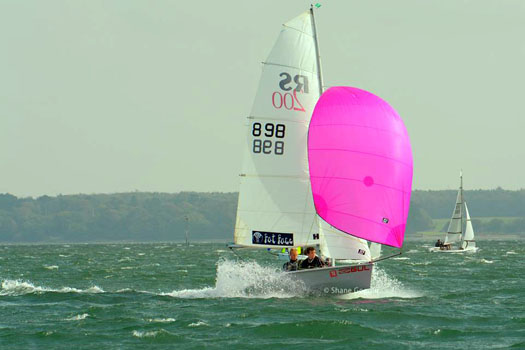
RS200 Race Report: 12 Teams, 6 Races, One discard
A good turnout for the final event of the season for the 200 fleet, made for some very competitive racing, and we may see a cork fleet develop next season in this exciting class. Ronan O'Driscoll and Shane Dunlea are sailing out of MBSC and many heads were turned in the RCYC at the weekend, by a boat that combines high performance and well worked out systems that are easy to use.
Day one was all about Marty O'Leary and Rachel Williamson (RSGYC), who mastered the conditions and dominated the fleet with a clean sweep of three race wins from three on day one. Marty had made the move from competing well in the 400 with Brian Fenlon recording an 8th at the Nationals in Galway this year.
Blair Stanaway and Heather King (RSGYC/Westport) were hanging in there with two seconds and a third to open, as were Stephen Craig and Conor Foley (RSGYC) with two thirds and a second.
It was to be more of the same from Marty and Rachel on day two, recording an impressive fourth race win from four, before allowing Blair and Heather to win the fifth race. Marty and Rachel however had now won the RS200 Southern title with a race to spare in a superb first outing.
Second was Blair and Heather two points back and third was Stephen Craig and Conor Foley a further five points adrift.
The 200 is a newer boat than the 400 and has a lower weight band being similar but slightly less powerful. The fleet in the UK is very large and strong, allowing easy access to affordable and fast second hand boats. There are also demo boats available in Ireland so please enquire if you are interested in getting involved. We are expecting growth next year country wide in this exciting class.
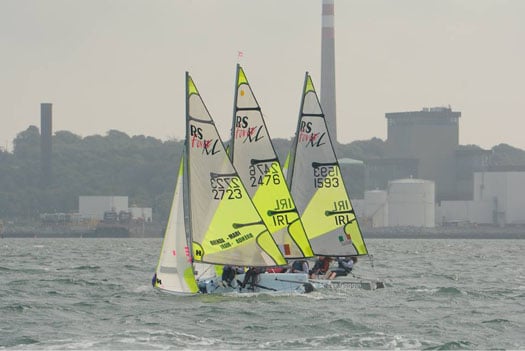
RSFeva Race Report: 9 Teams, 6 Races, One discard
The Feva class was full of RCYC competitors, making up over fifty percent of entries.
One of the bigger challenges of Day one was getting out to the race course through the tidal rush and sea one often gets in the entry to Cork harbour.
Once out there, the Feva's started an exciting series that saw Lorcan Tighe and Cian Murphy of NYC winning race one, with Dara Donnelly and Rosemar Tyrell (NYC/RIYC) second.
Donnelly and Tyrell were to finish second in the other two races of the day and were level on points with Sarah Cudmore and Kelly Williams (RCYC) after day one. Sarah and Kelly won race two and three and established themselves as favourites.
Day two, and to the in-harbour course and more wind. It was business as usual for Sarah Cudmore and Kelly Williams winning a further two races and taking the championship in fine style with a race to spare. Lorcan Tighe and Cian Murphey who sailed really well to three seconds on the Sunday were second overall, three points clear of Dara Donnelly and Rosemar Tyrell in Third. Suzi Fitzpatrick and Aine Riche (RCYC) won the final race to sit fourth.
Other honours went to first lady crew in the 400, Laura Holohan, she finished sixth overall with helm Paul McMahon. Sheela Lewis took first lady Helm and 14th overall in the 400 (John Lewis crewing). In the 200 Sarah Byrne took top lady Helm (crewed by Tom Gillan) and champion Rachel Williamson also took home top lady crew in the 200 (Marty O'Leary at the helm).
See here for full results
RS Sailors Tested at Greystones Eastern Championships
#rssailing – The first event of the season proved to be a testing one for all. After the first days squally conditions which saw the Fevas getting in only one race the Sunday dawned relatively benign.
Overall results are available to download below.
All launched around 10.30 and racing got underway with a full compliment of sailors on the water. Two races were finished in near perfect conditions with a lovely force 3-4.
The third race swiftly descended into the survival conditions which we had seen on the Saturday and it became increasingly obvious that there were more hulls than sails to be seen throughout the three fleets.
Most pairings however came ashore with broad smiles whether they had finished the race or not delighted with the fun and the blasting reaches which more often than not had ended with a swim.
Top Feva pairing of Alison Dolan and Grainne Young from BISC/NYC added to their first of Saturday with an 8th and another two firsts leaving them clear leaders.
Behind them the fleet was very tightly bunched with only a point separating the next three Emer Rafferty/Laura Coleman RSGYC , Alice Brennan/Isobel O'Grady GSC, and Triona Hinkson/Helen O'Beirne RSGYC.
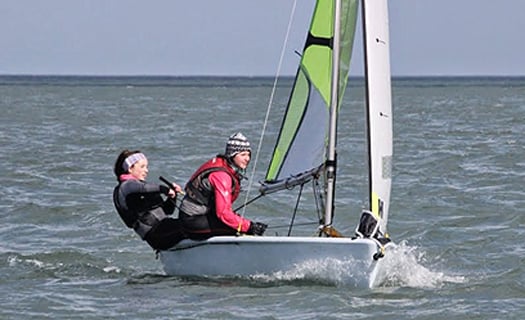
Feva girls Alison Dolan and Grainne Young
In the RS200s it was old time pairing of Marshall King and Heather King who took the honours with Frank O'Rourke and son Kevin in second. Third and first junior was Stephen Craig and Conor Foley. First lady prize went to Lisa Smith ably crewed by Megan Hayes.
Newcomer to the fleet and ex Enterprise and Laser sailor Chris Arrowsmith was there with his son Greg mixing it up a bit on the Sunday to make it an interesting day.
The 400s with a great showing of 26 boats were won by a single point by local boys Sean Cleary and Steve Tyner proving that consistency pays, counting three seconds a third and a fourth. Just behind them was Alex Barry with George Kenefick form MBSC/RCYC and Bob Espey/Michael Gunning BYC, again with only 3 points to separate them. Local men Simon Herriott/Sprinkles Moran were just behind in 4th
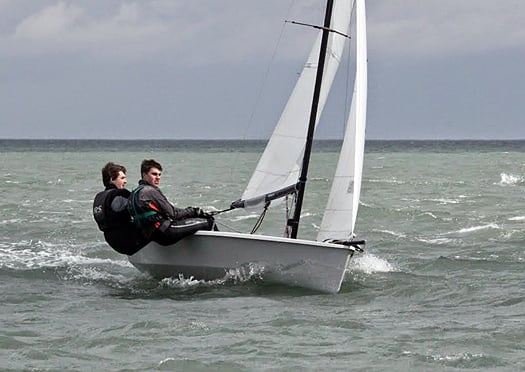
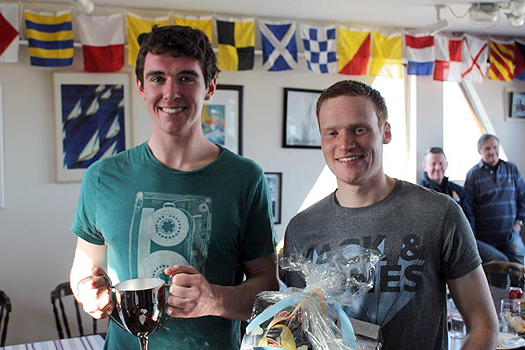
Greystones pairing Sean Cleary and Steve Tyner were RS400 winners
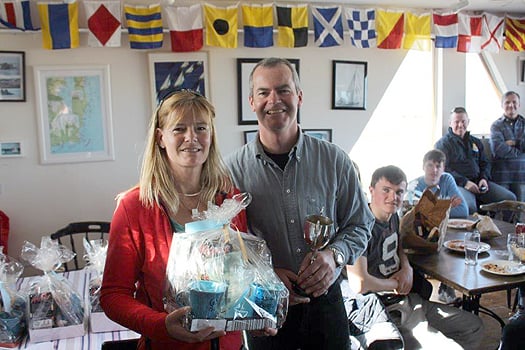
Counting five wins Heather and Marshall King walked away with the RS200 prizes
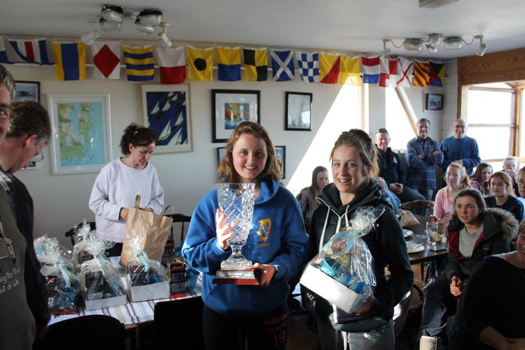
Three wins gave Feva girls Alison Dolan and Grainne Young the overall win
All in all it was an extremely successful event especially so early in the season and all thanks goes to Greystones Sailing Club for pulling out all the stops to make it happen. Thanks goes also to long suffering PRO Neil Murphy who had to contend with extremely shifty and squally conditions throughout the two days, and still managed to pull off a full series of 6 races place sealing a great weekend for the local fleet.
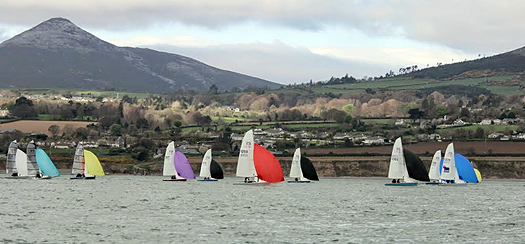
Irish Feva & RS Dinghy Class Associations Merge
#rsfeva – Following successful events together last year the RS Feva is now joining the RS200 and RS400 classes under the Irish RS Class Association umbrella. This makes the three classes a true double-hander pathway much as the Laser is for singlehanders.
The Feva/200/400 pathway caters for all ages and weights to compete and socialise at the same events.
The Irish season kicks off shortly with the Easterns at Greystones, April 12/13th and a Training event will be announced soon.
The Feva Europeans are on this year in Bruinesse, Holland from May 29th – 31st and the Worlds are on in Carnac, France from 25th July to 1st August.
Two excellent and accessible venues and a great opportunity to get up to speed before the Crewsaver Irish RS Nationals in Galway starting Friday 8th August.



























